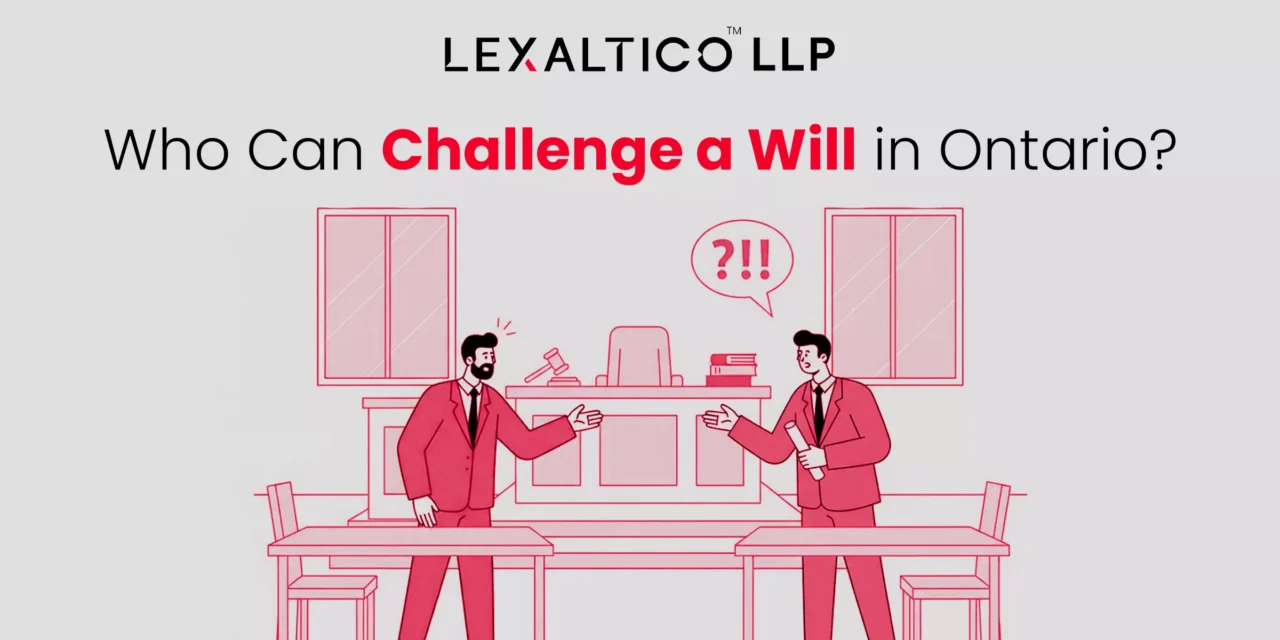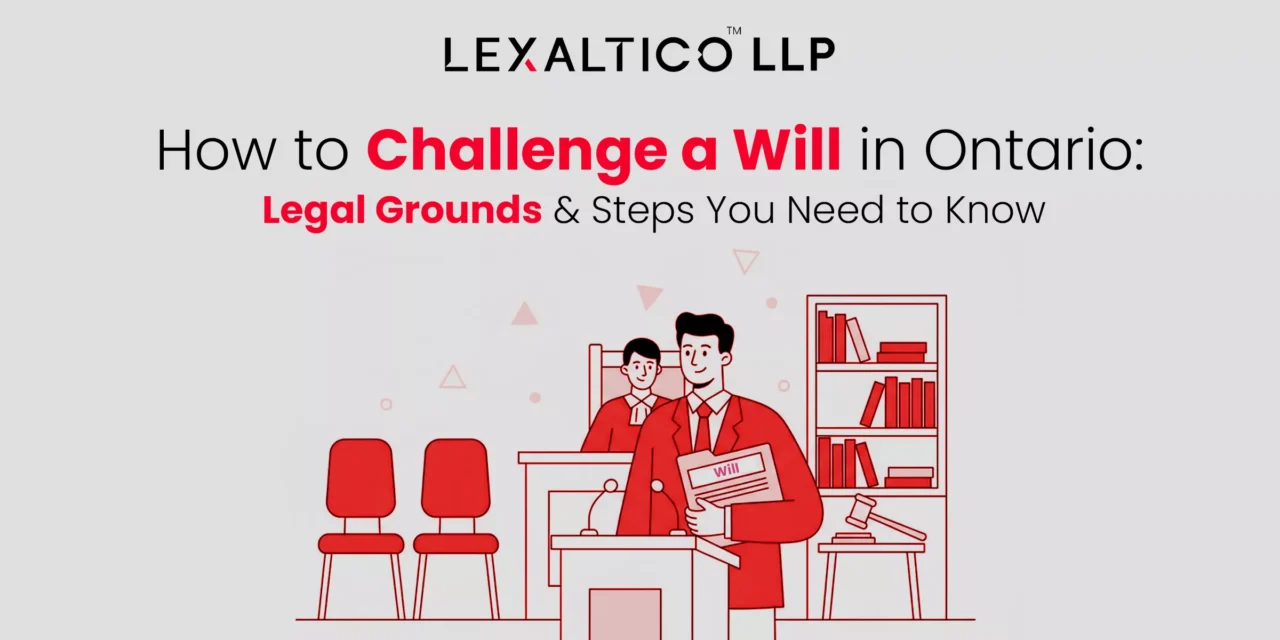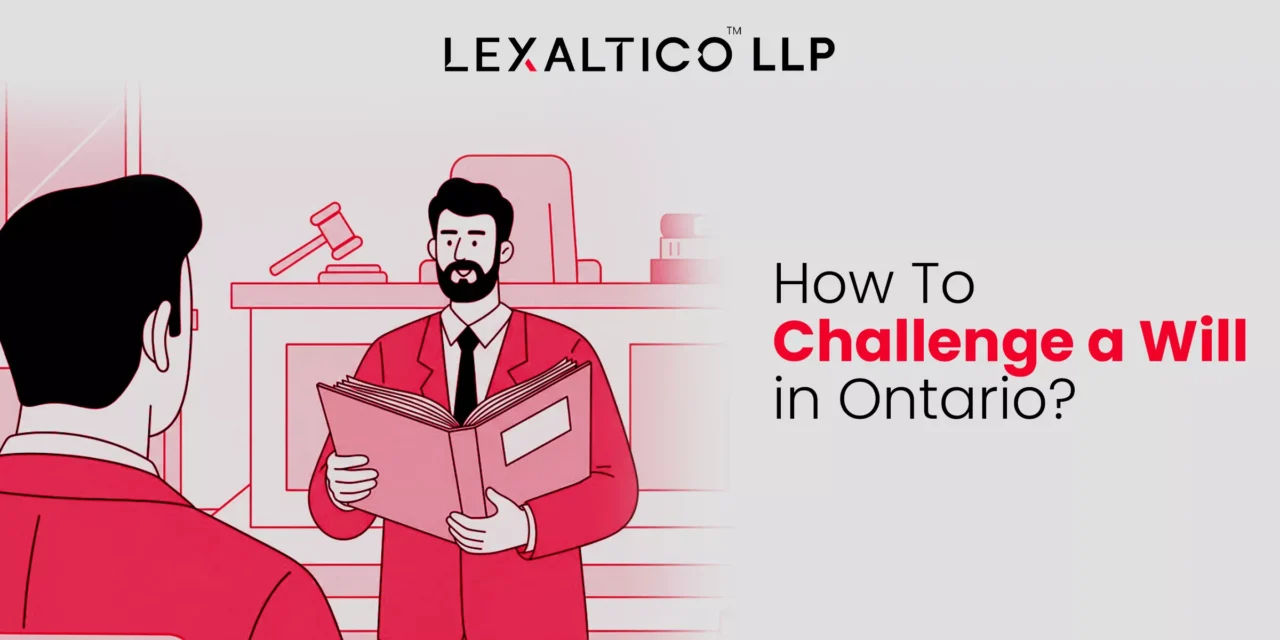If you believe a loved one’s will does not reflect their true wishes or that it’s unfair. You may wonder how to challenge a will in Ontario. This is a significant step, and you should be aware of the entire process. The law sets strict rules and guidelines. But yes, contesting a will is possible in Ontario under certain conditions.
In this article, we’ll discuss who can challenge a will in Ontario. Valid legal grounds (undue influence, lack of capacity, fraud, etc.) Procedural steps and how to challenge a will after probate. Evidence you’ll need, What to do next to get professional support.
What Does “Challenge a Will in Ontario” Mean?
To challenge a will is also called contesting a will. It means asking a court to declare that the will is invalid. It can be in whole or in part. Courts don’t ‘rewrite’ wills. They interpret unclear wording and, in limited cases, rectify drafting mistakes so the document reflects the testator’s actual intentions.
If the will has not yet gone through probate, then you might stop the process. If probate (Certificate of Appointment of Estate Trustee) is already granted, you may bring motions to reverse or halt the estate administration. This is sometimes called the challenge after probate in Ontario.
If a will has not been probated yet, you file a Notice of Objection to prevent the certificate from issuing. If it’s already probated, you bring a motion for return of certificate and direction to challenge it.
Who Can Challenge a Will in Ontario?

Not everyone can challenge a will. You must have standing, i.e., you appear to have a financial interest in the estate under Rule 75 of the Rules of Civil Procedure.
What does that mean in practice? You might qualify if you are:
- A legally married spouse. (Common-law partners are not considered “spouses” for intestacy in Ontario, but they may still have standing if they are dependants (financially supported by the deceased) or named in a prior will.)
- A child, grandchild, or descendant
- A dependent is someone who relied on the deceased for support.
- A person named in a prior will
- Someone who would be an heir under intestacy if the will fails
The law does not allow courts to rewrite wills because someone feels it is unfair. Ontario courts generally enforce a will that is validly made.
Legal Grounds to Challenge a Will in Ontario

Here are the most common legal reasons someone might challenge or contest a will in Ontario:
1. Lack of Testamentary Capacity
- This means the person who made the will didn’t understand what they were doing.
- They might not have fully grasped:
- What property did they own?
- Who might have a claim to their estate, or
- The impact of the will they were signing.
- In Ontario, the court assumes a person was competent unless proven otherwise.
- The burden of proof is on the person challenging the will to show that the testator lacked capacity.
2. Undue Influence
- This happens when someone pressures, manipulates, or coerces the testator to make or change their will.
- The influence must be so strong that it overrides the testator’s free will.
- It can happen through emotional control, isolation, or threats.
- Courts look for signs such as secrecy, dependency, or sudden will changes that benefit one person.
3. Improper Execution or Failure to Follow Formalities
- A will must follow certain legal rules in Ontario. For example:
- It must be in writing.
- Signed by the testator.
- Witnessed by two people. The law doesn’t forbid a beneficiary from witnessing, but any gift to a witness (or their spouse) is void (SLRA, s.12), so use non-beneficiary witnesses.
- If these steps aren’t followed, the will may be challenged.
Since January 1, 2022, Ontario courts have a ‘substantial compliance’ power under SLRA s.21.1 to validate a document that clearly sets out the testator’s final intentions, even if formalities weren’t met (discretionary, not automatic).
4. Fraud or Forgery
- A will can be challenged if it’s fake, altered, or created through deception.
- This may include forged signatures, altered pages, or false witnesses.
- Courts require strong evidence. Such as handwriting analysis or forensic document testing.
5. Ambiguity or Interpretation Problems
- Sometimes a will is written in a way that’s unclear or contradictory.
- When this happens, the court must interpret what the testator meant.
- Judges can:
- Remove unclear sections,
- Enforce only parts that make sense.
- Use outside evidence (like prior wills or letters) to understand the intent.
6. Prior Will or Revocation
- If more than one will exists. Then a dispute may arise over which will is valid.
- If the newest will is found invalid. A previous valid will might apply instead.
- The court carefully examines signing dates, witness details, and intent.
7. Dependent Support Claims
- Even if a will is valid, Ontario law allows dependents. Like a spouse, children, or financially dependent relatives to claim more support. If the will didn’t provide enough.
- This is done under the Succession Law Reform Act (SLRA).
- It’s not technically a will challenge but a separate estate claim for fair support.
8. Public Policy or Illegal Clauses
- Very rarely, a will may include terms that are illegal, immoral, or discriminatory.
- For example, a clause that encourages breaking the law or discriminates against someone could be struck down.
- The court can remove such terms under public policy grounds.
How to Challenge a Will in Ontario

Below is a more detailed and step-by-step procedure for how to challenge a will in Ontario.
Step 1: Act Quickly
Time is critical in will challenges:
- Ontario’s basic limit is two years from ‘discoverability’ under the Limitations Act, 2002. Recent ONCA guidance says time can run from when you obtain the will or know the facts giving rise to the claim.
- A Notice of Objection expires three years after filing unless withdrawn, renewed, or removed by court order (Rule 75.03(2))
- If probate was granted, the time for raising a challenge may effectively end or be restricted after distribution, so delay is dangerous. After probate, you must proceed under Rule 75.05 with a motion for return of certificate to pause estate administration before continuing the challenge.
Step 2: File a Notice of Objection (Form 75.1)
If the estate has not yet received a Certificate of Appointment of Estate Trustee, your first legal move is to file a Notice of Objection under Rule 75.03.
- In the Notice, you must detail your financial interest in the estate and grounds.
- Once filed, the court registrar refuses to issue the Certificate until the objection is removed or set aside.
- If a certificate is already granted, you cannot use Notice of Objection. Instead, you bring a motion for the return of the certificate to pause the estate process.
Step 3: Respond to a Notice to Objector and Appear
Once the Notice of Objection is filed, the applicant (who wants the certificate) must serve you a Notice to Objector.
- After that, you must file a Notice of Appearance within 20 days. Failure to do so allows the certificate application to proceed as though you had not objected.
- The applicant then has 30 days to bring a motion for directions.
- If they fail, you can also apply. That motion sets out how the case proceeds, scheduling, disclosures, timelines, etc.
Step 4: Motion for Directions / Procedural Orders
A motion for directions is procedural. The court hasn’t decided merits yet. It just gives a roadmap: what evidence, deadlines, and issues to address.
Often, there will be a case conference, settlement discussions, or mediation. In case parties can’t settle, the challenge moves to full litigation or a trial. Will challenges are complex and need careful handling of motions. If the certificate was already issued, you may need to bring a motion for the return of the certificate.
Step 5: Trial or Settlement
At trial or settlement, parties present evidence. Like medical records, expert opinions, witness affidavits, documents, emails, prior drafts, etc.
The judge then decides on the basis of:
- Whether the will (or part of it) is valid
- Whether it should be invalidated
- Whether a prior will applies
- If no valid will, applies intestacy rules
- Possibly adjusts distributions, awards costs, etc.
Post-Probate Challenge
Yes, you can challenge a will after probate, but it is harder.
- You must still file a Notice of Objection or bring a motion, depending on whether a certificate was issued to challenge post-probate.
- The two-year general limitation still applies.
- If assets have been distributed, recovery may be more complex, and claims may be limited.
- You must still prove valid legal grounds.
What Type of Evidence Is Needed?
To stand a chance in court, you need strong evidence. Common forms include:
- Medical and mental health records show incapacity.
- Expert testimony from neurologists and psychiatrists.
- Witness affidavits from people who observed the testator, saw them sign, or noted abnormal behaviour
- Emails, letters, communications that suggest coercion or undue influence
- Drafts of earlier wills or revisions
- Forensic document analysis (signatures, handwriting)
- Financial records, bank statements, receipts showing who benefited
- Chain-of-custody evidence if forgery or tampering is suspected
Also, courts often give deference to well-prepared wills that were executed with care, multiple witnesses, and legal oversight, making them harder to overturn.
What Happens If the Court Upholds the Challenge?
If your challenge succeeds:
- The will or parts of it are invalidated.
- A prior valid will may take effect (if one exists).
- If no earlier valid will is found, the estate is distributed under intestacy laws.
- The court may modify or strike clauses (for interpretation, ambiguity)
- Costs and legal fees will be resolved (who pays whom)
If the challenge is rejected, the original will remain fully valid. If the challenge fails, the will remain valid. Courts may order you to pay costs, especially if the objection was unreasonable or in bad faith, but there are no “penalties” beyond costs.
When to Get Professional Help
Because of the complexity, strict rules, high stakes, and cost risks, challenging a will is rarely something to do on your own. You’ll want the help of an experienced estate litigation lawyer.
They can:
- Review your case and tell you whether your grounds are strong
- Help you file the Notice of Objection or motions properly
- Collect and structure evidence (medical, expert, documents)
- Assist with motions, court appearances, and procedural strategy
- Evaluate settlement vs full trial
- Manage cost risk, negotiate, and advise you on the probability
Quick FAQs
Anyone with a financial interest in the estate. Like spouses, children, dependents, or those named in prior wills. You must have standing under Rule 75.03
Usually, two years from discovering your grounds, the Notice of Objection expires in three years unless acted upon.
Yes, by motion for return of certificate or post-probate application. But it is harder and subject to stricter proof and limits.
Medical records, expert opinions, witness statements, draft wills, communication records, forensic analysis, etc.
The will may be invalidated fully or in part. A prior will may apply, or intestacy rules used. Costs are ordered among parties.
Disclaimer: The information provided in this blog is for general informational purposes only. It is not legal advice and should not be relied on as such


